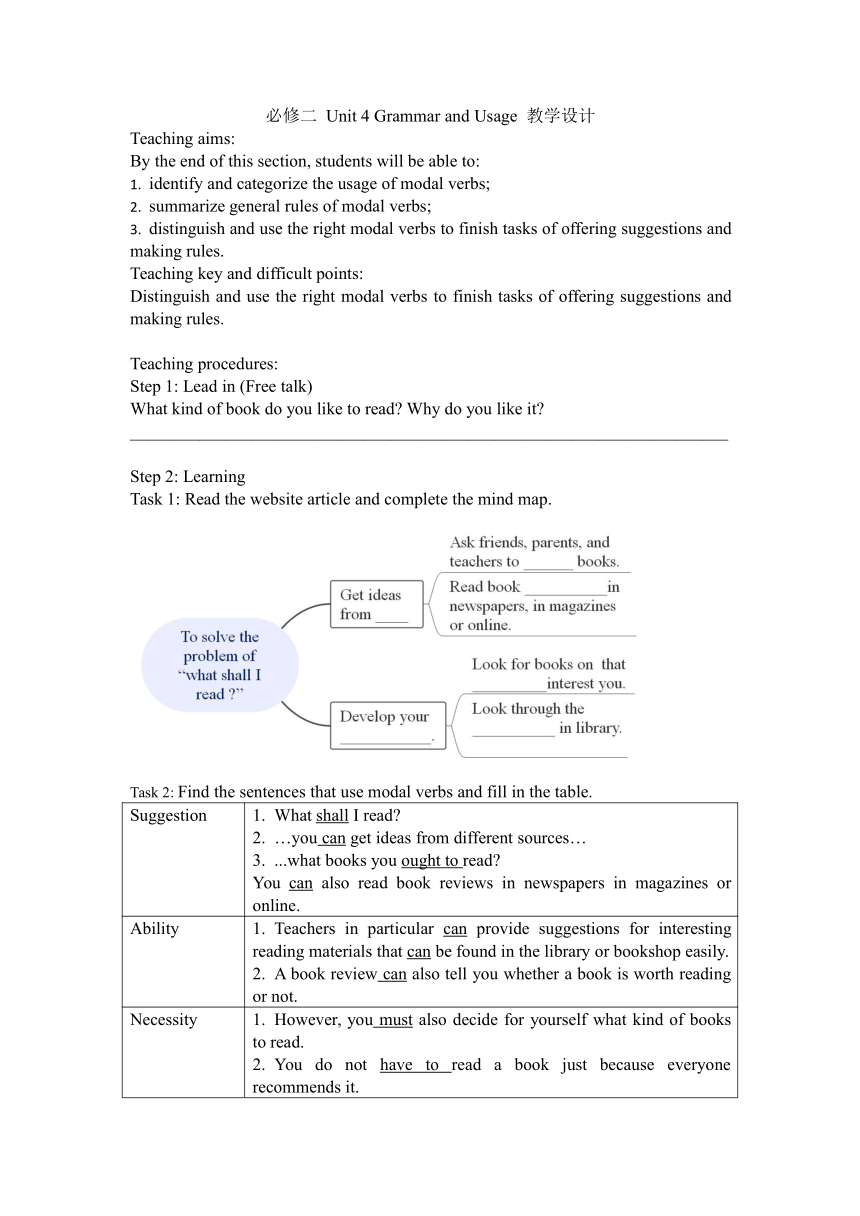
必修二 Unit 4 Grammar and Usage 教学设计 Teaching aims: By the end of this section, students will be able to: identify and categorize the usage of modal verbs; summarize general rules of modal verbs; distinguish and use the right modal verbs to finish tasks of offering suggestions and making rules. Teaching key and difficult points: Distinguish and use the right modal verbs to finish tasks of offering suggestions and making rules. Teaching procedures: Step 1: Lead in (Free talk) What kind of book do you like to read Why do you like it _____ Step 2: Learning Task 1: Read the website article and complete the mind map. Task 2: Find the sentences that use modal verbs and fill in the table. Suggestion What shall I read …you can get ideas from different sources… ...what books you ought to read You can also read book reviews in newspapers in magazines or online. Ability Teachers in particular can provide suggestions for interesting reading materials that can be found in the library or bookshop easily. A book review can also tell you whether a book is worth reading or not. Necessity However, you must also decide for yourself what kind of books to read. You do not have to read a book just because everyone recommends it. Possibility You might have asked yourself this question more than once. These ideas should point you in the right direction. …you may find yourself better able to seek out books to your taste… Working out the rulers Model verbs can express ability or necessity. They can also make suggestions or describe the probability of an event. The same modal verb can have different functions. Modal verbs can be followed by _____. (a,d,e,f) You can choose more than one answer for the blank. do(the base form) d. be done(the passive voice) b. doing(the verb-ing form) e. be doing(the continuous form) c. did (the past form) f. have done (the perfect form) Task 3: 情态动词 定义:情态动词是一种本身有一定的词义, 表示说话人的情绪,态度或语气的动词,但不能单独作谓语,只能和其他动词原形构成谓语。 常见的情态动词主要有:can/could,may/might,must/have to,will/would,shall/should/ ought to,dare等。 can/could 表示能力,意为“会,能” Eg. I can speak English fluently. 表示可能性,意为“可能会” Eg. Water can be turned into ice if it is cold enough. 表示许可或请求, 意为“可以” Eg. Can you speak English Fluently You can’t eat in the classroom. 表示推测,常用于否定句和疑问句中 can’t=can not 意为“不可能” Eg. The door is open. Who can be in the classroom This book can’t be mine. My book is in my bag. may/might 表示请求,许可,意为“可以”,比can/could更为正式 Eg. May I open the window You may/can call me tomorrow. 表示推测,用于谈论可能性,常用于肯定句,意为“可能,或许” Eg. I can’t find my book, I may have left it in my home. 表示祝愿 Eg. May you get more than you wish. must/have to 表示“必须” Eg. I must keep my word. It rained heavily, so the students had to stay at home. 注意:must多为主观意志,have to多为客观需要;must只有一种时态,have to 则有多种时态 ... ...
~~ 您好,已阅读到文档的结尾了 ~~